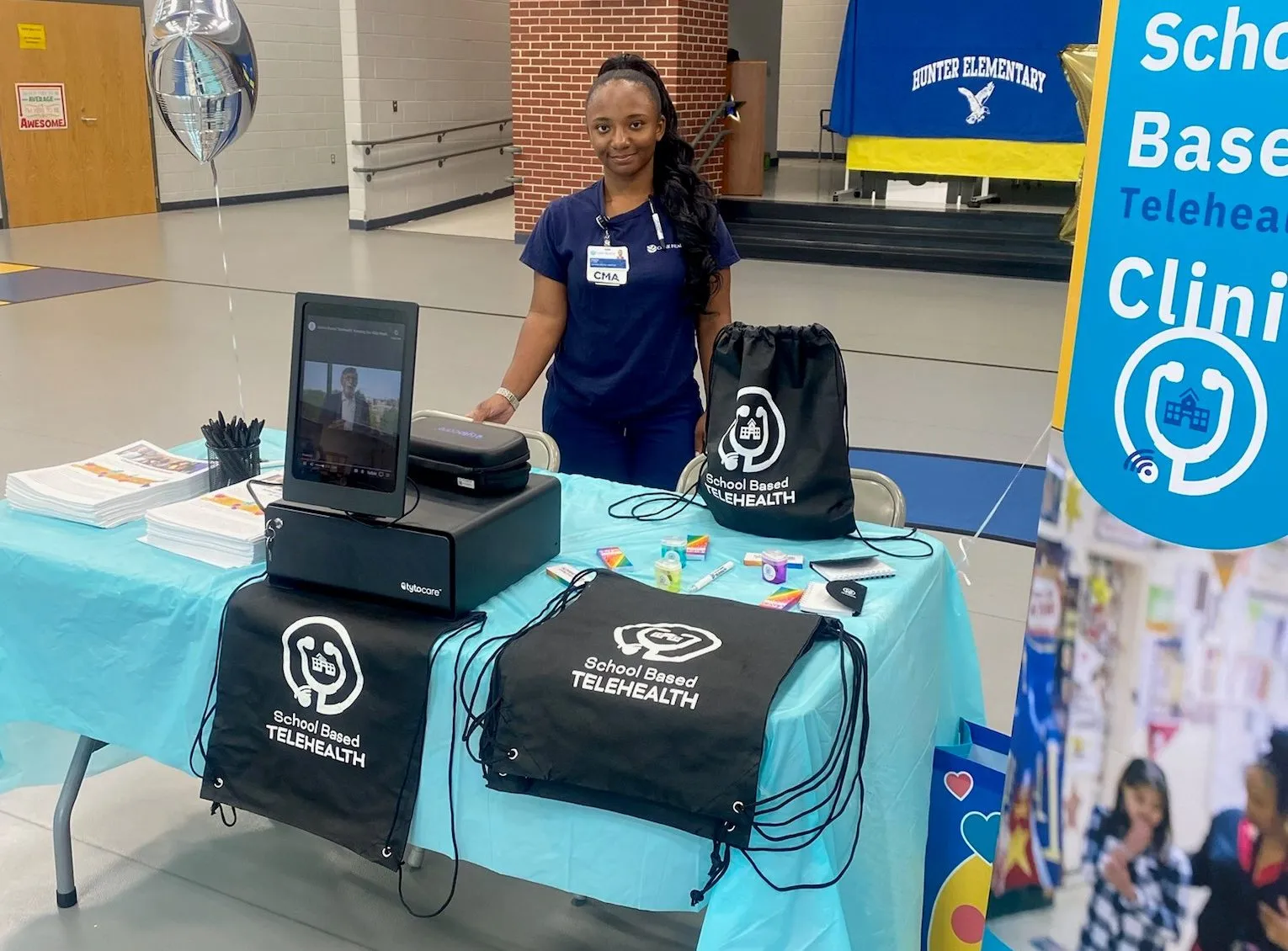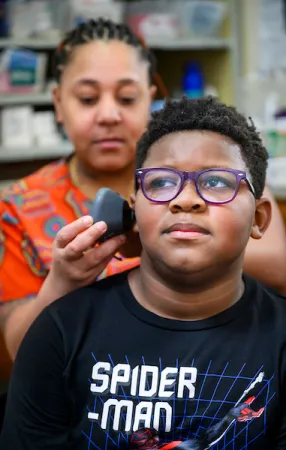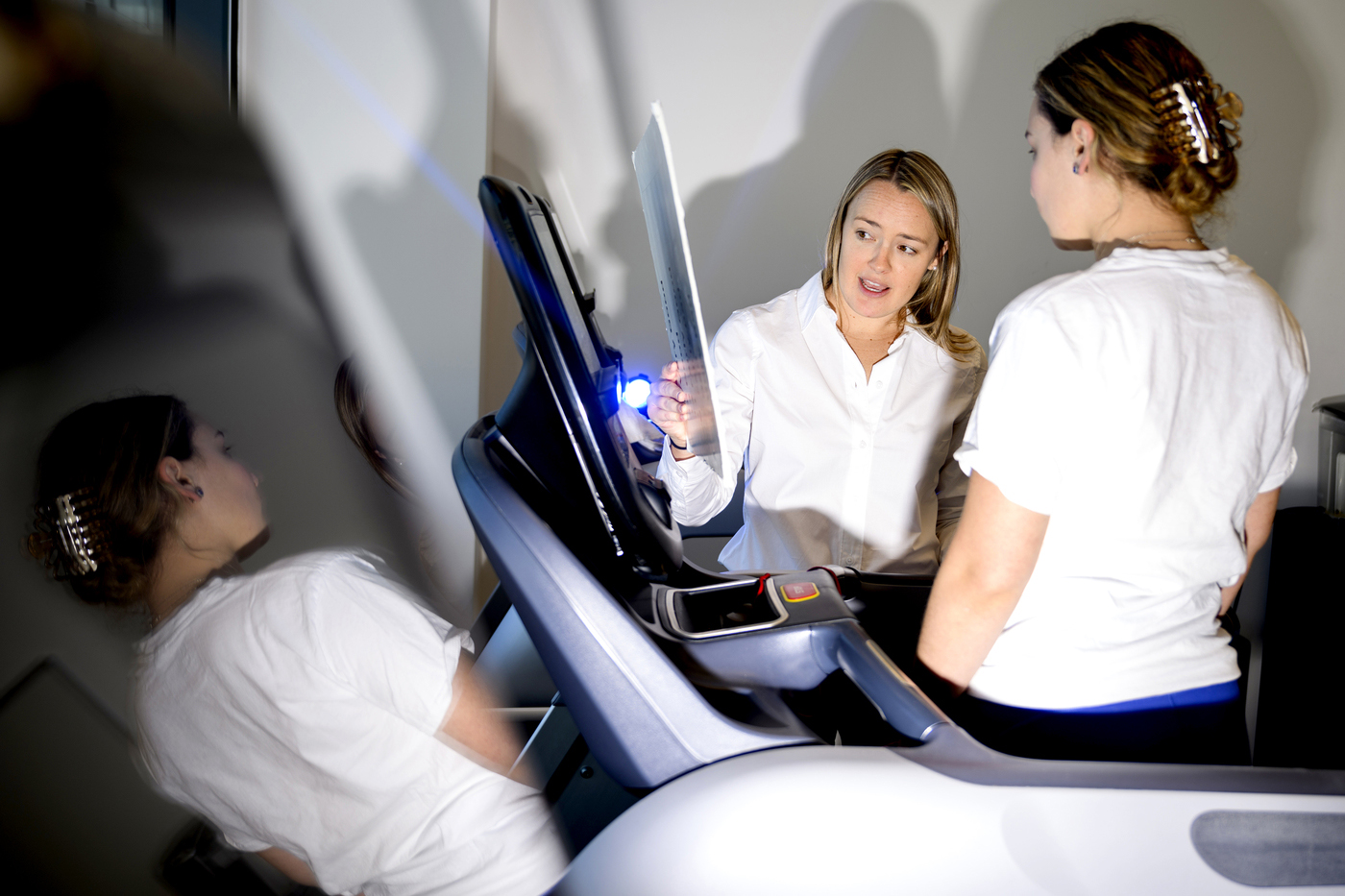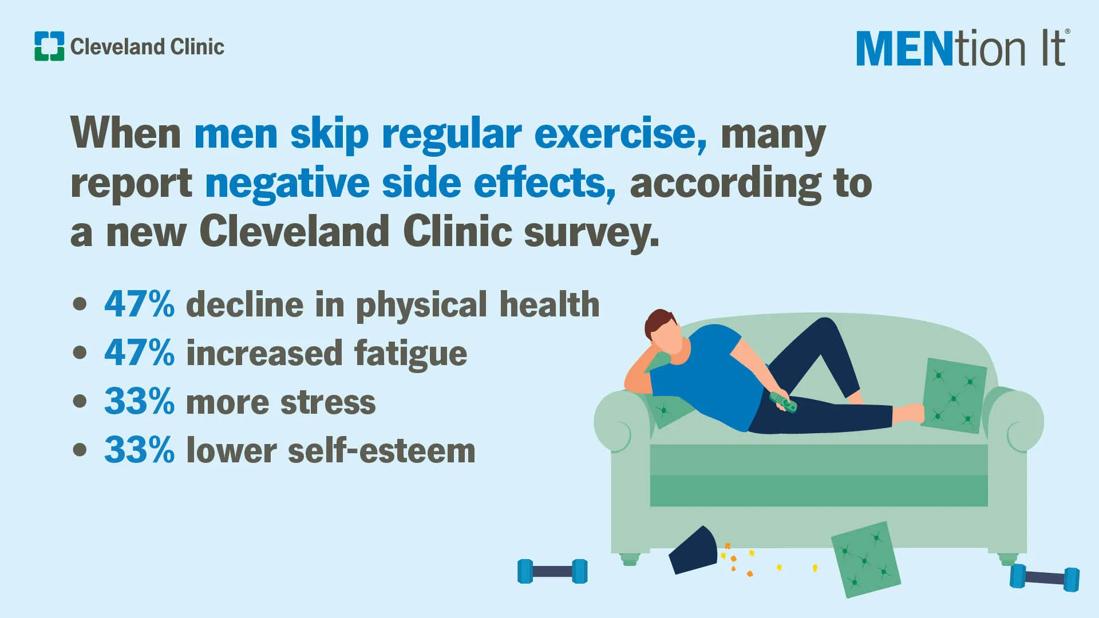A telehealth pilot offers remote therapy to Greensboro school

 |
This article was originally published by North Carolina Health News on Sept. 4, 2025.
Greensboro-based Cone Health is expanding its school-based telehealth program to offer remote mental health services for the first time.
Students struggling with anxiety, depression, or other mental or behavioral health issues can be connected to a therapist during the school day, said John Jenkins, medical director of Cone Health School-Based Care. The services will be similar to Cone Health’s telehealth program for physical health, where a doctor or nurse practitioner can remotely examine a student with the help of a certified medical assistant and technology that transmits information in real time.
Jenkins said they’re adding behavioral health services because school officials saw a need.
“We’ve seen a significant number of students who are frequent presenters,” he said, adding that the physical complaints that bring students to school-based clinics in three Piedmont Triad school systems often are connected to something else that is causing them stress.
![]()
Sign up for the EdDaily to start each weekday with the top education news.
The most commonly diagnosed mental disorders in children ages 5 to 17 are anxiety problems, behavior disorders and depression, according to the U.S. Centers for Disease Control and Prevention (CDC).
Psychologist Emily Odjaghian said that research shows anywhere between 40% and 90% of mental health issues experienced in adolescence can be identified in early childhood.
“We have to engage in the kind of resources and treatment and screening that can identify and help these children before there’s a crisis,” said Odjaghian, who is executive director of the Lucy Daniels Center, a nonprofit mental health provider in Cary.
Telepsychiatry in NC schools
In the U.S., at least one in six children ages 6 to 17 experience a mental health disorder each year, according to the National Alliance on Mental Illness.
To better reach children who are struggling, a growing number of programs are providing telepsychiatry in North Carolina schools.
Cone Health’s program will be piloted at Alderman Elementary School in Greensboro, Jenkins said. Montlieu and Union Hill elementary schools in High Point, Moss Street Elementary in Reidsville and Hillcrest Elementary in Burlington are expected to be added later in the school year. All are high-poverty schools that have students on waitlists to receive mental or behavioral health services, Jenkins said.
“We will have a slow rollout, and we hope to, by the end of our rollout, be in every school that we have physical health,” Jenkins said.
Students will be able to have therapy sessions in school, with a community care worker present to help the provider who is connected remotely. Jenkins said Cone Health is also partnering with Duke University Health System-based NC Pediatric Access Line, which provides mental health consultation and education to North Carolina clinical and social service providers.
“There have been lots of studies to show how effective brief therapeutic encounters are to deal with some of the childhood trauma issues and childhood behavioral issues,” he said.
The community care worker also handles scheduling and can ensure that sessions minimally impact a student’s educational time, Jenkins said. They can also work with the family to find out if there are barriers, such as finances or transportation, preventing the child from getting care or that could be affecting the child’s mental or physical health. The community care workers can make referrals to support services to help the family.
Teachers can also work with the community care workers to help students in class. For example, a student who is taught deep breathing to help calm anxiety may need a reminder when they become anxious during class, Jenkins said. The community care worker can instruct the teacher on how to do that.
“So that community care worker has a role in the visit, a role in the school and a role in the community, which is a really unique deployment in this environment,” Jenkins said. “So we’re really excited about that.”
Combatting chronic absenteeism
Cone Health’s school-based telehealth program started in 2021 with a pilot program in Bessemer Elementary School in Greensboro. It officially kicked off in 2022 with a handful of sites in Guilford County. With the addition of 12 sites this year, it has grown to 40 schools across three counties.
Parents have to provide consent for their children to be seen at the clinics. A provider gets pulled in for cases such as an earache, upset stomach, injuries and colds, for example. Minor issues, such as headaches, are handled on site by the certified medical assistant.
Of the sites added this academic year, 10 are in Guilford County Schools, and there is one each in the Rockingham County and Alamance-Burlington school systems.
For Guilford County Schools, the goal is to be in all of the high-poverty elementary schools to reach the most at-risk students, Jenkins said.
Health advocates say that school-based telehealth care cuts down on absenteeism, ensures that students receive routine care that they might not otherwise be able to access, and can even boost test scores.
“Chronic absenteeism is endemic in the United States,” Jenkins said. “(Students) miss too much school.”
Statewide, 24.96% of students were chronically absent in 2023-24, according to the North Carolina School Report Cards. Chronic absenteeism is defined as missing 10% or more of days in a school year for any reason.

For Guilford County Schools, 30.89% of students were chronically absent that school year. It was higher in Alamance-Burlington (32.06%) and Rockingham County (33.30%).
Missing too much school not only puts students at risk of dropping out, it also puts them at risk for unhealthy behaviors, such as alcohol and drug use, and poor long-term health outcomes, according to the American Academy of Pediatrics. Not graduating high school is associated with increased mortality risk or lower life expectancy, research shows.
Jenkins said that 90% of students who participate in a telehealth session return to class that day.
Guilford County Schools officials have seen improved attendance at all of the participating schools, according to data shared earlier this year at a conference on telehealth in schools.
In another move to expand services and keep students in class, the clinics are looking to offer on-site testing this fall for the flu, COVID-19, and strep — common contagious illnesses.
Providing this testing will allow students whose results are negative to return to class instead of going home to wait for a doctor’s appointment, Jenkins said.
“Again, it’s all about attendance,” he said. “If children can experience school to the maximum amount, we know that their achievement will be higher, their probability to graduate will be higher, their ability to gain the tools to fulfill their potential is higher — and that’s what our focus is.”
This article first appeared on North Carolina Health News and is republished here under a Creative Commons Attribution-NoDerivatives 4.0 International License.![]()
link







